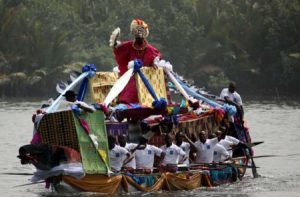by Shayna Watson
Water plays a unique role in our daily lives by providing us the ability to remain healthy and well. Outside of it fulfilling a crucial need, water serves as a symbol of purity, fertility, and rebirth in many cultures. The people of the Niger Delta region have recurring festivals that concentrate on the two great spirits believed to govern the earth – hero people and water people. Folklore from these areas explains that hero people originated from water people, coming from them in order to live with mankind. According to this story, water people are the most powerful spirits and the genesis of man. Many villages hold these celebrations for the enjoyment of the spirits, to honor these great forces and request that the spirits control water levels, increase fish supply, and keeping flooding at bay. The Kalabari, a tribe of the Ijaw people living in the Western Niger Delta region of Nigeria, hold a four-day festival to honor Duminea, the head water spirit of their village.
During this major annual festival, the Kalabari remove a ritual basket from a shrine erected to the water spirit. Designated villagers take the basket on a canoe-guided journey to a small stream dedicated to Duminea. After the traditional religious rituals are completed at the site of the spirit’s rivulet, the rest of the villagers organize elaborate performances dedicated to the water gods that use masks and intricate structures made from material gathered by the river bank. The masks are said to be created according to the wishes of the water spirits and often include fish tails and fins. Dancers from the village perform routines around towering structures, erected to look like humans, with their faces pointing upwards toward the sky to emulate how they believe the spirits are postured while floating around the streams. Priests and priestesses of the village perform dances, often invoking and embodying the important spirits of their village. are then manipulated by dancers to delight the spirits with the hope that they will be generous to the village in the upcoming year. The fishing and agriculture that sustain the Kalabari are dependent on water, so the Kalabari and many other tribes in the Niger Delta region work very hard to please the water spirits they believe control the bounty of their closest water sources.

In addition to these religious rituals, people of the Niger Delta region hold many celebrations and jubilant festivals that revolve around water. The annual boat regatta festival includes sailboat races and many days of other water activities. Documentation of these festivals record that villagers can be heard chanting “peace, strength. children, life!” as a call to the spirits of what they hope for their future. Access to clean water affects all aspects of life, and the Kalabari people (and many others) wish for the opportunity to have prosperous lives full of health for them and their children.


